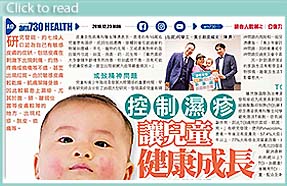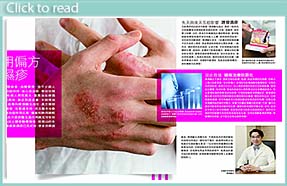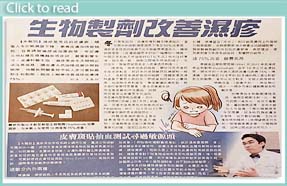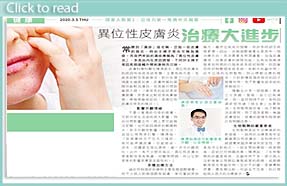 HOME
HOME- Skin Condition
- Atopic eczema
Atopic eczema
Atopic eczema is a common chronic relapsing, itchy skin inflammation that can affect all age group. It may affect more than 10% of infants, some patients may outgrow the disease, around 4.6% of 6-7 year-old from some local data remained to be affected by atopic eczema. Infants with atopic eczema usually have asthma and allergic rhinitis later in their life.
In practice, eczema is always itchy. Infants usually have their face affected, then the rash may develop over the joint areas. The itchiness sometimes affect sleeping quality. Patients may find it difficult to stop scratching, this may inflict more skin wounds which allow allergens entry and the skin may become thickened locally which is called lichen simplex chronicus.
The exact cause of eczema is still not clearly understood yet, but we know the cause is multifactorial. Recent studies showed skin barrier function certainly play a role: patients with skin barrier dysfunction caused by filaggrin gene mutation resulting in severe skin dryness. This can lead to more allergens or microbes to enter the skin. Another important cause is overactive immune system to allergens which may give rise to clinical skin inflammation.
Although there is no cure, atopic eczema can be controlled effectively most of the time with appropriate skin care, medical treatment and by avoiding aggravating factors. There are various tests for allergens but they are not always accurate or clinical relevant, a detailed clinical history is still the most important way to identify any possible allergen.
Skin care products should be fragrance-free, alcohol-free to minimize irritation, paraben is a common preservative that has high risk of allergy. Emollient helps keeping the skin moist and should be applied liberally every day. to Ceramide is an important ingredient of emollient to strengthen the skin barrier function in addition to its moisturizing effect.
Topical steroid is usually used during eczema flares because of its anti-inflammatory effect.

Topical steroids with different potency can be used for different severity. Side effects like skin atrophy, focal hypertrichosis, and acneiform eruptions depend on the potency, amount and duration of steroid used. Topical calcineurin inhibitors reduce the skin inflammation by blocking the production of proinflammatory cytokines and mast cell activation. With their debatable risks on lymphoma, it is considered as a second line therapy, for short and non-continuous treatment.
Oral anti-histamines are commonly used for their anti-pruritic effects, but this kind of medication does not reduce the skin inflammation and may cause drowsiness in some patients. In severe cases, phototherapy and oral immunosuppressant may be used to control the extensive and disturbing skin inflammation.
Biologics Treatment for Eczema


Public Education on Eczema Management



Clinic the above articles to read (Chinese Only)









